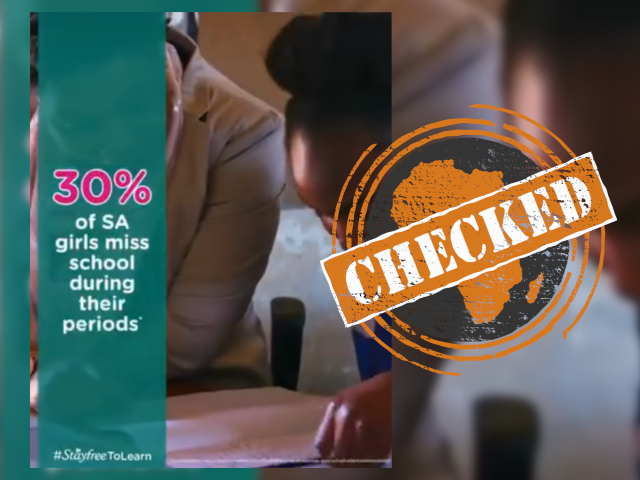A Facebook post published in Nigeria tells women there are a number of things they mustn’t do during their periods, and offers other “don’ts” to avoid cancer and infertility.
In summary, the post’s advice is:
The post has been shared more than 35,000 times, attracting 500 comments and 7,500 reactions. A few websites and blogs have also picked it up.

The source of the advice is given as the Indonesian Cancer Extension Institute. The post is illustrated with four disturbing images of surgery on a severely swollen belly.
Africa Check could find no organisation called “the Indonesian Cancer Extension Institute”, in advanced searches on Google and other databases.
A reverse image search reveals the four photos were originally published in a March 2017 article on the UK’s Daily Mail news site.
The article tells of an unnamed 24-year-old woman from Mexico who had an ovarian cyst weighing 5 stone (32 kilograms) removed from her abdomen. Nothing in the article linked the cyst to any of the symptoms or “don’ts” in the Facebook post.
Dr Aloysius Inofomoh, a consultant obstetrician based in Lagos, Nigeria, says all the post’s claims are false.
“None of these claims can be proven scientifically,” he said. “Taking ice water or cold drinks does not affect menstruation and ice water is not a risk factor for uterine cancer.”
He added: “Cucumber is a vegetable that, when eaten, passes through the alimentary canal. It does not get to the uterus at all. There is no relationship between it and barrenness.”
He said that if a woman is hit in the abdomen, depending on the strength and location of the impact, “vomiting of blood means there is severe injury to the stomach or oesophagus - not the uterus”.
Dr Kingsley Ekwuazi, a senior lecturer and consultant obstetrician at the University of Nigeria at Nsukka rated every single claim in the Facebook post as false. – Motunrayo Joel (15/05/19)
In summary, the post’s advice is:
- Women shouldn’t drink ice water or soda water during menstruation, or eat coconut. It claims “research proves” that drinking ice water can “cause menstrual blood remaining in the uterine wall” and lead to “uterus cancer or tumour” after five to 10 years. No reason is given for avoiding soda water and coconut.
- It tells women not to use shampoo during their periods “because the pores of the head are open during menstruation and it can cause headache”. This, it says, is “very dangerous” and the effects “can be felt when young and later when aged”.
- Women mustn’t eat cucumbers when they’re menstruating, the post says, because “the sap present in the cucumber can block some menstruation (blood waste) in the uterine wall”, which could cause barrenness.
- Finally, the advice goes, women’s bodies “should not be knocked or hit by hard objects, especially the abdomen” because it could cause them to vomit blood, and the uterus could be injured. This, it says, is the “origin” of cancer of the uterus, as well as of “cysts and barrenness”.
The post has been shared more than 35,000 times, attracting 500 comments and 7,500 reactions. A few websites and blogs have also picked it up.

Ovarian cyst images from 2017
The source of the advice is given as the Indonesian Cancer Extension Institute. The post is illustrated with four disturbing images of surgery on a severely swollen belly.
Africa Check could find no organisation called “the Indonesian Cancer Extension Institute”, in advanced searches on Google and other databases.
A reverse image search reveals the four photos were originally published in a March 2017 article on the UK’s Daily Mail news site.
The article tells of an unnamed 24-year-old woman from Mexico who had an ovarian cyst weighing 5 stone (32 kilograms) removed from her abdomen. Nothing in the article linked the cyst to any of the symptoms or “don’ts” in the Facebook post.
Claims ‘not scientifically proven’
Dr Aloysius Inofomoh, a consultant obstetrician based in Lagos, Nigeria, says all the post’s claims are false.
“None of these claims can be proven scientifically,” he said. “Taking ice water or cold drinks does not affect menstruation and ice water is not a risk factor for uterine cancer.”
He added: “Cucumber is a vegetable that, when eaten, passes through the alimentary canal. It does not get to the uterus at all. There is no relationship between it and barrenness.”
He said that if a woman is hit in the abdomen, depending on the strength and location of the impact, “vomiting of blood means there is severe injury to the stomach or oesophagus - not the uterus”.
Dr Kingsley Ekwuazi, a senior lecturer and consultant obstetrician at the University of Nigeria at Nsukka rated every single claim in the Facebook post as false. – Motunrayo Joel (15/05/19)
Republish our content for free
For publishers: what to do if your post is rated false
A fact-checker has rated your Facebook or Instagram post as “false”, “altered”, “partly false” or “missing context”. This could have serious consequences. What do you do?
Click on our guide for the steps you should follow.
Publishers guideAfrica Check teams up with Facebook
Africa Check is a partner in Meta's third-party fact-checking programme to help stop the spread of false information on social media.
The content we rate as “false” will be downgraded on Facebook and Instagram. This means fewer people will see it.
You can also help identify false information on Facebook. This guide explains how.



Add new comment